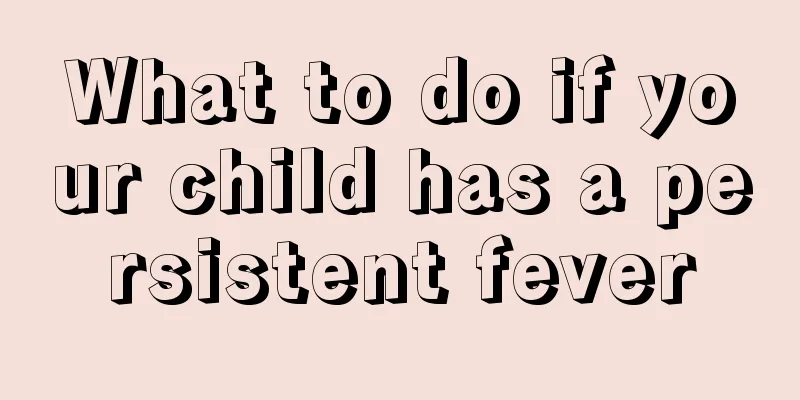What causes children to have frequent stomachaches?

|
If children often have stomach pain, they may have symptoms of bloating and pain. This is because the baby's gastrointestinal tract is not fully developed and too much complementary food is added. Digestive tract infection is also a cause of children's frequent stomach pain. It is recommended that you understand the causes of children's stomach pain, and then choose treatment methods based on these causes. You can learn about the specific reasons below. 1. Hernia pain Colic is the most common cause of abdominal pain and crying in babies. What exactly is colic? Colic is a description of the uncontrollable crying symptoms of a healthy baby. If the baby is less than 5 months old, cries for more than 3 hours a day, 3 days or more a week, and lasts for more than 3 weeks, and no other medical cause is found, he may have colic. Unfortunately, there is currently no cure for this type of colic, and parents can only rely on comforting their children to ease their tears and pain; the good news is that this type of colic will generally disappear on its own after the baby is 5 months old. 2. Gas pain It is very common for babies to have gas pain within the first 3 months after birth because their intestines are not yet fully developed. When the baby is 6-12 months old, adding complementary foods and constantly trying new foods may also cause gas pain. 3. Constipation Once your baby's stool begins to form, the most common cause of tummy pain in your baby is constipation. If you notice that your baby has fewer bowel movements than usual, especially if he has not had a bowel movement for more than 3 days and if bowel movements are very painful, he may be constipated. In addition, if your baby has dry stools and difficulty passing bowel movements, these are also symptoms of constipation. If your baby has started eating solid food, in order to relieve constipation, you can give your baby more foods that can loosen the stool, such as oatmeal, apricots, plums, pears, peas, etc., and reduce foods that easily cause dry stools, such as bananas, apples, applesauce, carrots, rice, pumpkin, etc. At the same time, you should pay attention to giving your child more water. In addition, exercise can help intestinal movement and also facilitate bowel movements. 4. Gastroesophageal reflux Many babies will spit out a little bit after feeding or nursing, and some may even vomit. If your baby does this often, he may have gastroesophageal reflux. When reflux occurs, the valve between your baby's esophagus and stomach doesn't work properly, and food and acid from the stomach can flow back up into the throat, causing stomach discomfort and a burning sensation in the throat and chest. Gastroesophageal reflux mainly occurs in babies under 1 year old. If you think your baby may have reflux, be sure to tell your doctor so he or she can teach you how to relieve your symptoms and monitor your baby to prevent the development of GERD. 5. Acute gastroenteritis If your baby has a tummy ache and is vomiting or having diarrhea, it's likely he or she has acute gastroenteritis, also known as the stomach flu, which is the second most common illness after the common cold. If acute gastroenteritis causes vomiting, diarrhea, fever or loss of appetite in your baby, it can easily lead to dehydration in your baby. Therefore, you must ensure that your baby consumes enough fluids, which can be breast milk or formula milk. If you find that your child has symptoms of dehydration, you must seek medical attention immediately. 6. Other infections Many people may not believe it, but colds and flu can also cause stomach pain in babies. This is because the mucus produced by upper respiratory tract diseases flows down the throat and irritates the stomach and intestines. Vomiting can help them clear the mucus and relieve pain. Additionally, urinary tract infections and sometimes even ear infections can cause stomach pain and even nausea and vomiting. This article details the 6 main reasons why children have stomachaches. If you are a parent of a child who often suffers from stomachaches, and if you want your child to be healthier, then you'd better actively refer to this article to find out what exactly is causing your child's stomachache so that you can prescribe the right medicine. |
<<: Child has stomachache and vomiting in the middle of the night
>>: What to do if your child's head is swollen
Recommend
How to treat tooth decay in three-year-old babies
Many children have tooth decay, especially three-...
Symptoms of a newborn's fussiness
In our lives, there are always some babies who ar...
Why does the child's belly button hurt?
The belly button is the scar left when we cut the...
Causes of hair loss in newborns
Anyway, after giving birth, young mothers are ver...
What should I do if my nine-year-old child is nearsighted?
Today's parents attach great importance to th...
What should I do if my child has chickenpox and a fever?
We all know that babies are usually given some va...
What should I do if my baby keeps having green poop?
It is the common wish of all parents that every b...
What should I do if my child's palms are rough?
It is said that children are in the best period o...
What are the vision standards for children?
With the popularity of electronic products such a...
What is the disease prevention knowledge in kindergarten?
After the baby is born, when he grows to a certai...
What to do if your child has bloating and vomiting
Children's gastrointestinal development is no...
How to treat intestinal spasms in children
Intestinal spasm is a relatively serious disease,...
What are the benefits of eating bird's nest for children
Bird's nest is rich in water-soluble protein ...
What to do for babies with allergies
As the weather gradually warms up, many parents w...
What’s going on when my baby has green, thin stools?
Green stool is the biggest problem that mothers e...









